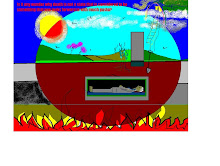ESSAY ABOUT THE ROOFS OF JAPAN: Memories of my time spent in Japan during the early 1960s by Robert L. Huffstutter
When I first arrived in Japan, in August of 1961, my first impressions were so many and varied it is difficult to describe in a short essay, but it is an essay I have been writing in various form throughout these past years. Each mention I make of Japan is part of this ongoing essay, one that will only end when my life ends. So, to say that Japan made an impression on me is an understatement. From that first day in August so many years ago, my love and fascination for Japan has increased into volumes, many yet to be recorded, though I continue writing.
Now, about the roofs. The roofs of Japan are like no other roofs anywhere, their tiles, their decor, their natural blend into the ever-present shilouettes of the hills behind almost every scene in the old woodblocks, the early photographs, the contemporary photographs, and in almost each of my own paintings of Japan.
I love the roofs of Japan, the ones in your image, the traditional and classic. But not those roofs only, no, but the roofs of the lesser structures too, those wooden structures still remaining that were constructed in the 19th century. They were plentiful to the eye in the early 1960s and I hope there are many left.
But those roofs constructed to simply provide a roof over one's head have a certain type of charm too; they are not just slopes of plywood like so many I see in the USA, put up to keep the rain out and nothing more. No these economical roofs constructed to keep one dry in Japan do not forget tradition or heritage, thus even those roofs have a personality of their own, and they weather soon to appear as though they were built when Hearn was looking down at Yokohama from his hilltop abode.
But enough about the roofs, those with history and those built for residential purposes and commercial purposes. The eventually converge and meet in the metropolitan congestion of cities in Japan. My relationship with the cities of Japan is confined mostly to Yokohama. Yes, Yokohama, I knew it well for my time spent. It was Yokohama where I went for sketching, for a getaway on weekends, for a time to party, Oh, Yokohama, I knew you well. Your roofs were alway the subject of my visual delights as I rode the trains to and from Sagami-Otsuka.
They flew by me quickly on those trains that stopped at towns like Tsuruma, Yamato, and so many others before finally reaching the train station in Yokohama. Oh, what a mass of humanity going one way and another, quickly and briskly, soon to disappear in one shopping street and then another.
During my first few weeks of residence in Japan, my footsteps fell on many streets that fascinated me, but were not the streets where I had intended on going. I was always looking for Iza-zake-jo, that street where everyone seemed to want to be, where there were hundreds of paper lanterns hung at a most ornate entry, plastic cherry blossom attached to the many lines that run along the way, sakura, sakura, pink and beautiful even when the season was over. And always the joyful aromas of delicious curry and soba with strange spices I had never tried. The roofs, the roofs, with their diverse angles popping up with impressive dragon motifs and little symbols I knew nothing about.
The roofs of Japan, yes, they made quite an impression on me my first day in Japan, and on my last day in Japan too. As the vessel that took me away from my beloved left its wake from the pier at Yokosuka, heading for my country, there were tears in my eyes for a country I had loved from my very first day, and a country that I would love forever.
We had shared so many hours together; we had shared stories abot our families and we shared sad moments when she told me about her father, a man she never knew. She was the daughter of a Burma Road soldier and never returned home. She had shown me his photo once, and then never again. He had looked so young and handsome in his uniform. We understood that all was forgiven. It had not mattered to us. What had mattered had been the time we had spent sketching in Sankien gardens, in Yamashita park, in Hakone and by the side of little roads in villages when we just decided to let the trains take us where we wanted to go.
As my vessel moved away from the pier, we waved, she with a white hankerchief, me with my hand and then my hat until there was no longer an image but only a memory. And the ship moved beyond the horizon. She turned and returned to her home in the large apartment buildings of Totsuka; I stayed on deck of that large transport, leaning on the rail, still seeing what I imaged were the shilouettes of those eternal mountains, but they were ghost images only. When the sun finally set on the Pacific, I turned in for the night and wrote a letter.
The roofs of Japan appear in my paintings and in my dreams. When I return, the reality of those roofs will make me smile once again.
THIS ESSAY HAS NOT YET BEEN COMPLETELY EDITED FOR ERRORS............
Saturday, February 27, 2010
Subscribe to:
Post Comments (Atom)







No comments:
Post a Comment